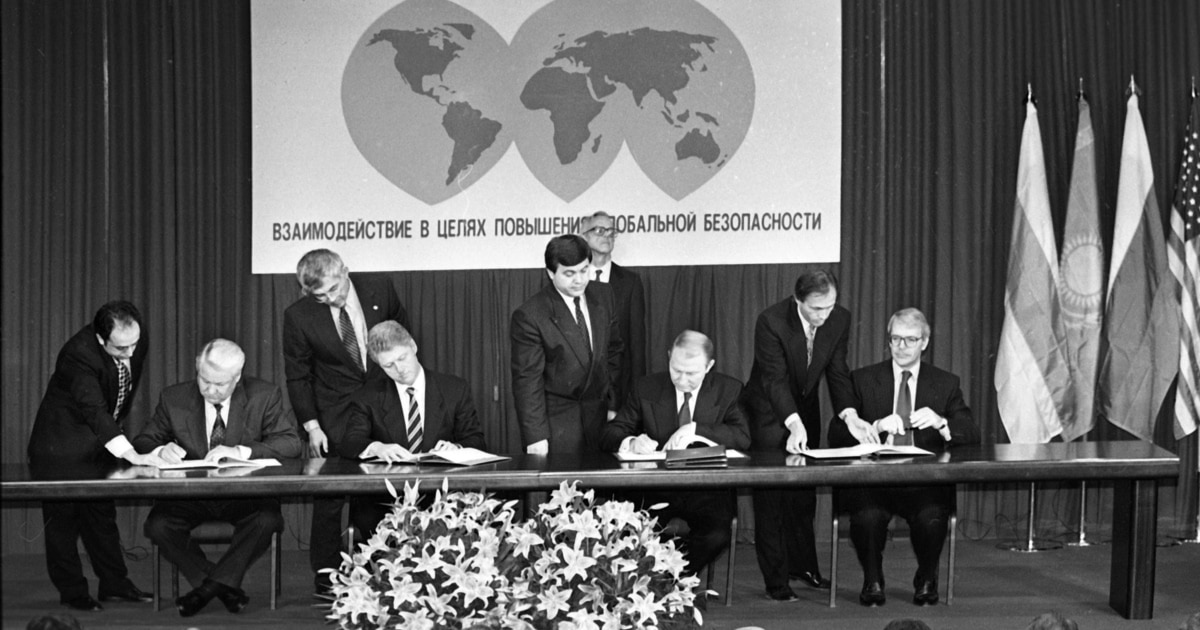As diplomatic efforts to end Russia’s war against Ukraine have intensified in recent days, Kyiv and its backers have sought to ram home a key point: lasting peace is only possible with credible, enforceable security guarantees for Ukraine, not merely symbolic pledges or paper agreements.
This is rooted in Russia’s record of ignoring treaty pledges to respect Ukraine’s territorial integrity and independence.
“A security guarantee can also be something like the Budapest Memorandum of 1994,” Clifford May of the U.S.-based Foundation for Defense of Democracies told RFE/RL’s Current Time.
“Russia signed it. America signed it. Britain signed it. And it said, we will all respect the territorial integrity of Ukraine. That security guarantee was not literally worth the paper it was written on,” May said.
The memorandum is one of at least six international agreements that Russia’s aggression in Ukraine has violated. These include a 2003 border treaty signed by Russian President Vladimir Putin himself, the 2010 Kharkiv agreements enabling Russia to maintain its naval base in Crimea, and the 2014-15 Minsk Accords aimed at ending combat in the Donbas.
Treaties Violated By Russia In Ukraine
1. The UN Charter
2. The Almaty Declaration (1991)
3. The 1997 Treaty of Friendship and Cooperation between Russia and Ukraine
4. The bilateral border treaty (2003)
5. The 2010 Kharkiv Agreements
6. The 2014-15 Minsk Accords
All this makes Ukraine understandably wary of agreeing to a peace deal with Russia without having credible security guarantees in place.
At talks in Washington on August 18, US President Donald Trump offered reassurance. While he ruled out allowing Ukraine to join NATO, he said European countries “want to give protection…and we’ll help them out with that.”
Trump also said that European countries would provide “the first line of defense,” but the United States would “be involved.”
But the details must still be nailed down.
Boots On The Ground
European countries have been planning, since March, a military force to be deployed to Ukraine after a cease-fire or peace deal. Here too, almost no details have been made public, although Britain and France have said they would be prepared to put boots on the ground.
Political leaders in European capitals have always made it clear that a prerequisite for a mission is US involvement, and Trump has now spoken of providing help including air support.
European military planners were set to meet US counterparts this week to discuss this, and US Secretary of State Marco Rubio has, according to Axios, been tasked with leading the talks.
Roland Freudenstein, founder of the Brussels Freedom Hub, a think tank, called the Washington talks “a Groundhog Day” as “in substance nothing too positive has really happened.”
“The real question here is to what extent there will be European boots on the ground and to what extent there will be American backing for this European presence in Ukraine,” Freudenstein told RFE/RL.
Moscow has repeatedly said that the presence of NATO troops in Ukraine would be unacceptable.
NATO-Lite
After last week’s Alaska summit between Trump and Putin, US Special Envoy Steve Witkoff told CNN that discussions yielded the potential for granting Ukraine “Article 5-like” protections, referring to NATO’s mutual defense clause.
This could work without troops being deployed. But again, no details have been provided. May warns that “people need to understand” what exactly Article 5 is in practice.
“Article 5 under the NATO treaty says you attack one NATO member, you’ve attacked all NATO members, and theoretically, all NATO members will respond. Is it definite that it will happen? I’m not absolutely sure, and this worries me,” May said.
This brings the debate back to the beginning — how can Ukraine be given a security guarantee that is more than a promise that can later be broken.
Freudenstein said that Trump “talked about the security guarantee in a very general, murky way,” and, therefore, “we really have no idea what exactly the United States is to provide” to Ukraine.
